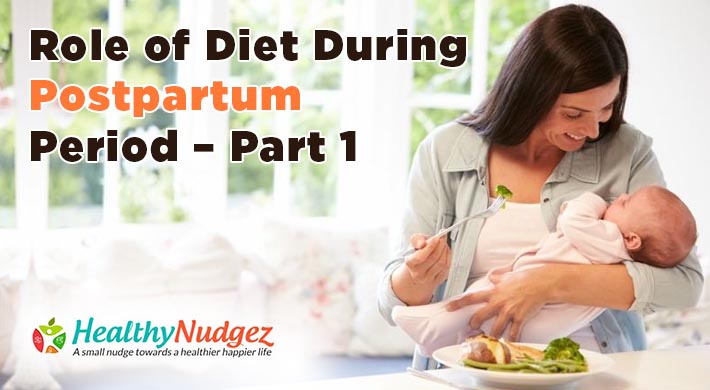Role of Diet During Postpartum Period – Part 1
Postpartum Depression and the Important Nutrients
A postpartum period begins immediately after the birth of a child as the mother’s body, including hormone levels and uterus size, returns to a non-pregnant state. The terms puerperium or puerperal period, or immediate postpartum period are commonly used to refer to the first 6 weeks following childbirth- Wikipedia.
The birth of a baby can trigger emotions, from excitement and joy to fear and anxiety. But it can also result in something one might not expect, that is- depression.
Most new moms experience postpartum “baby blues” after childbirth, which commonly include mood swings, crying spells, anxiety and difficulty sleeping. Baby blues typically begin within the first two to three days after delivery, and may last for up to two weeks.
But some new moms experience a more severe, long-lasting form of depression known as postpartum depression. Rarely, an extreme mood disorder called postpartum psychosis also may develop after childbirth.
The World Health Organization(WHO) describes postnatal period as the most critical and yet the most neglected phase in the lives of mothers and babies; most maternal and/or newborn deaths occur during the postnatal period.
A number of studies have found that when moms feel unprepared or are struggling to cope up with all the changes to their physical health after they have had a baby, they are more likely feel overwhelmed, stressed, anxious or depressed, which is the just opposite of how one wants to feel as a new mom. Sarcastic, but it’s true & hard to believe, until you yourself experience the same.
A mother’s body undergoes a major transformation during pregnancy and more just after labor and delivery. There is plenty of week-by-week information about growing belly, however, the mother’s health and body after birth often gets overlooked, as one copes up with the big issues of caring for the baby and functioning on little sleep.
Although it is important that a new mother and those around her, take good care of her to rebuild her strength, have sound mental health and restore nutritional status.
Giving birth is deeply awesome, but to get back to be herself & to restore her nutrient levels, hormones, muscles and everything else is going to affect experiences of the early days of motherhood.
Feeling dull and exhausted is pretty common in the first few weeks after delivery, but these symptoms can also be linked to low levels of iron. New mothers are at higher risk of iron deficiency following childbirth, due to blood loss during delivery.
If the mother is breastfeeding, then she would need vitamins A, E, C and B complex, choline, chromium, copper, iodine, selenium and zinc,
Some research suggests vitamin D deficiency may lead to a higher risk of postpartum mood disorders, but it isn’t conclusive, so ask the treating doctor about taking supplements.

